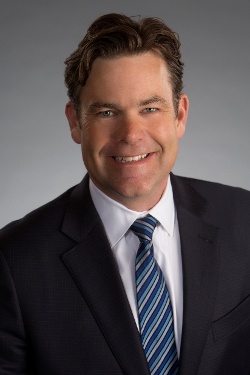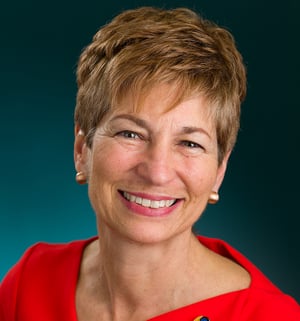For seniors housing and care operators, the battle to protect residents from the deadly COVID-19 global pandemic can get personal. Their experiences, particularly in the early days of the disease’s spread, shed light on the immense effort it has taken to protect America’s most vulnerable elders, and also on the toll that struggle has taken on residents – and staff – alike.
The 2020 NIC Fall Conference presented a collection of “Operator Spotlights” designed to provide some first-person insight straight from the leaders who have been facing the pandemic, and its many challenges, every day since it first hit the U.S. Each spotlight focused on not only the challenges faced, but the solutions leaders put in place—short term and long term—to protect their staff and residents from potentially spreading or contracting the disease.
Fee Stubblefield, CEO, The Springs Living, focused on the science of detecting COVID-19 with surface testing. Saying, “In the early days of COVID we weren’t sure what information to believe,” Stubblefield explained how surface testing led his company to understand that COVID-19 is actually airborne, and continues to be a powerful tool to help prevent infection throughout the company’s communities.
 Stubblefield pointed out that surface testing offers many advantages to operators. Response rates are quick, and it can detect the presence of COVID-19 even when residents test negative. Regular testing inspires confidence in residents and staff, at a lower cost than managing an outbreak. Looking ahead, Stubblefield said that, “COVID-19 has changed the way seniors housing providers must operate. Organizations will need to embrace the reality that you cannot deliver great care without delivering a safe environment.”
Stubblefield pointed out that surface testing offers many advantages to operators. Response rates are quick, and it can detect the presence of COVID-19 even when residents test negative. Regular testing inspires confidence in residents and staff, at a lower cost than managing an outbreak. Looking ahead, Stubblefield said that, “COVID-19 has changed the way seniors housing providers must operate. Organizations will need to embrace the reality that you cannot deliver great care without delivering a safe environment.”
Lynne Katzmann, President & CEO, Juniper Communities, focused on collaboration, as well as prevention and rapid, accurate, and inexpensive testing. Katzmann began by saying, “COVID-19 has challenged us all in ways that were unimaginable just six months ago.” Her top three learnings over that period are that COVID-19 is ‘invisible and insidious,” prevention is even more important than control of the disease, and testing is “our key weapon…before there’s a vaccine.”
Katzmann relayed how she looked early on at the testing and contact tracing which had seen success overseas, and decided to employ similar tactics, even at a time when many believed testing should be conducted only on symptomatic individuals. Like Stubblefield, who worked with academic institutions to help study the virus’ spread, Katzmann partnered with the scientific community on innovation, both to help, as she said, “not only to protect Juniper, but to also positively impact our industry, and most importantly the wellbeing of older adults.” 
Working with CRISPR gene-splicing scientists from MIT, and a testing lab, Juniper helped validate a new cheek swab test, which they’ve been using since September. She believes the test, which is more comfortable, and doesn’t require a healthcare professional to administer, will enable broader and more affordable testing across the industry.
Lori Alford, COO, Avanti Senior Living took a few minutes to focus on the importance of managing stress for her exhausted staff. Saying, “COVID fatigue is extraordinarily real,” Alford described just how difficult the COVID-19 pandemic has been, both for frontline workers and the support and leadership staff who face the threat and challenges of the pandemic on a daily basis. “They not only had to manage the fear, they had to manage their children being home all day, or dealing maybe with their spouse being home, but they continued to have to go to work,” she explained.
Avanti launched a 6-week coaching program with staff because “What the team needed was mental wellness.” Each week, staff participated by watching a video, joining a group coaching call, and journaling throughout the week. Despite early skepticism, Alford saw real improvements in her team. “At the end of the six week journey…not only did I see a difference in transformation in the minds when they came to work for Avanti, but I would listen to them talk, and they would say, ‘I’ve shared this with my family. I’ve shared this with my friends. This has helped me grow personally, not just professionally…’ as a leader, ‘Wow!’…I would put this in the top 3 career highlights.”
As a result of the positive results on their initial coaching program, Avanti is rolling it out for every department head in the organization, with hopes of eventually making the program available for the rest of their staff as well.
For Dwayne J. Clark, Founder & CEO, Aegis Living, it was essential to be creative and proactive early on in the crisis. He described numerous initiatives his organization launched, in order to understand how to fight COVID-19, best serve the needs of residents and families, and how to support his staff through an extremely difficult and stressful period.
Early on, Aegis Living formed an advisory council. “We relied heavily on these seven professionals,” he said, describing their diverse medical backgrounds, spanning gerontology, epidemiology, immunology, naturopathy, and even psychiatry. Aegis then launched numerous initiatives. These included chat suites for residents, outdoor living rooms, where residents could meet and even dine with family members and loved ones, and ‘hugging walls,’ which enable a safe means to touch, hold hands, and hold one another through a medically safe disposable barrier.
Like Alford, Clark discussed the need to provide emotional support for staff. They implemented a telemedicine program, available to staff and their families for immediate access to a doctor – without having to undertake the risk of a hospital visit. $1 meals were available for staff to take home to their families. A childcare swapping program better enabled staff to manage their at-home childcare needs. “So, we really had to be creative, we really had to listen to our employees, and think about ‘what are their issues.” Said Clark. He pointed out that, at a time when many providers are struggling to get staff to come to work, Aegis has avoided that problem. “It was because we were so thoughtful about their food needs, their medical needs, their childcare needs, their mental health needs.”
Jack Callison, CEO, Enlivant, not only faced the threat of COVID-19, but had to evacuate several properties as the result of both Hurricane Laura, which caused flooding in Lake Charles, Louisiana, and wildfires that forced evacuation from Talent, Oregon. His presentation focused on lessons learned from those experiences. “You’ve probably got your evacuation protocols, and I’m sure everybody has their COVID protocols; but you need to merge those two playbooks together,” Callison said.
He then reviewed numerous details to consider, including doubling the number of busses that will be needed during a pandemic, in order to maintain social distancing. He suggested reaching out to local EMS and fire departments for help loading and offloading frail elders. In some cases, Enlivant found that evacuating to a hotel was the better choice, over moving residents to a sister facility. In every case, he advised to ensure to drop-ship appropriate supplies of PPE to the evacuation site.
Callison provided tips for coordinating with a hotel. Call ahead and have the hotel remove door bars, to avoid the possibility of staff being barred from entry. Also, ask for universal key cards to access rooms. He also emphasized the need to maintain social distancing, in some cases separating numerous evacuated communities by keeping them on separate floors, and always keeping residents in their rooms. Enlivant also “opened the door” for family members and even pets, to join their residents for the evacuation. The organization arranged to take over the hotels’ commercial kitchens, in order to ensure safety protocols, and prepare three meals a day for every evacuee. They also coordinated with their food service provider to route food deliveries to the hotel.
“The most important thing that we did, that served us well,” Callison said, was a daily call hosted by executive directors with families. The 4PM daily calls delivered consistent messaging to families and provided the efficiency of answering questions all at once, rather than in a time-consuming one-by-one approach. Callison, like all of the other operator leaders, also mentioned another core aspect of success: his staff. He said, “everything that I’ll share with you today is a function of the amazing human beings we have in the Enlivant communities, who are executing our protocols every single day. We’re so incredibly proud of the wonderful job they’re doing, keeping our elderly population safe.”
Video replays of these Operator Spotlights remain available to registrants of the NIC 2020 Fall Conference. Click here to log in to on demand access.